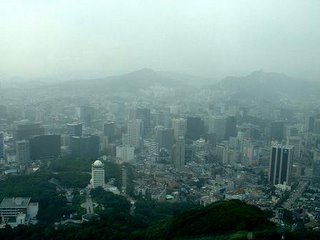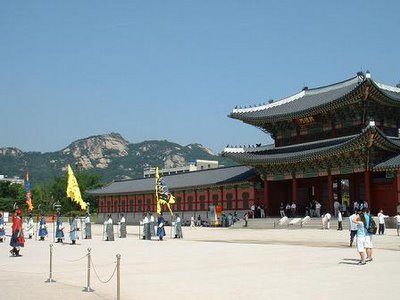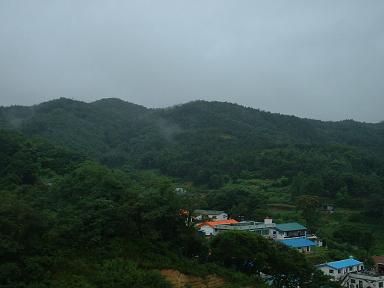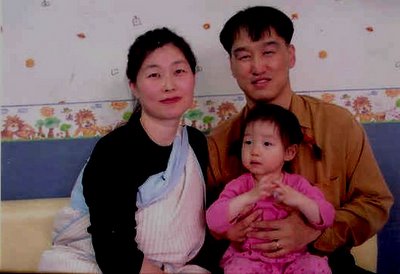Past Glory
Mission Training Institute, Seoul, South Korea
-
A Short Introduction
The Mission Training Institute (MTI) in Seoul mainly focuses on training missionary candidates by improving their English. It is supposed that if missionaries learn English, then they can go anywhere in the world. To this end, apart from learning English in class, the students have to ‘live in English’. There are signs around the building that read ‘Speak in English at all times’. The situation is slightly absurd when I think about it. Thirty Koreans go to a place in their own capital city and struggle to communicate with each other in English, all the while able to communicate perfectly in Korean. However, it is good preparation for when they find themselves on the mission field where no one speaks Korean.
-
My purpose in being there was to assist in teaching conversational English. By virtue of being English myself, I was reckoned to be reasonably fluent. I took three different classes, English Conversation, English Bible Study, and English Idioms. It was my first teaching experience and I thoroughly enjoyed it.
-
First Impressions
 [A typical summer's day over Seoul]
[A typical summer's day over Seoul]I was forewarned that it would be hot, so stepping out of the airport I was ready for a wave of hot air. It was warm but not as I expected it to be. Like most summer days in Korea, it was very dull. I could not see the sun at all and visibility was limited to around 200 metres of clear vision. Nevertheless, it was very humid and felt a little like a steam room although not quite so hot. The airport was clean and air-conditioned, as was the coach which took me, (and Song-Deok whom was sent to fetch me) from the airport to Seoul. The coach also had a television and large comfortable seats. The transport system in general seemed to be clean and efficient, this was confirmed throughout my stay, both on buses and the underground system. Moreover, public transport is inexpensive, a single ticket on the underground in Central Seoul costs around 35p, compared with a zone 1 single in London for £1.80 When we disembarked in Seoul I noticed a strange smell, it was pollution. As a large city, Seoul has a pollution problem, so much so, that when it rains, even if it is only light rain or drizzle, everyone carries an umbrella because they are worried that acid rain will make their hair fall out.
-
Arriving at MTI I made my first cultural faux pas, (as far as I know), I walked in to the dormitory area with my shoes on. Koreans always remove their shoes before entering their home - sometimes restaurants and tea-shops also have areas where customers sit on the floor at low tables without their shoes. It was around lunchtime when I arrived and they had made roast beef as a welcoming meal, it was very nice of them but it was nothing like home cooking. After lunch Mihyang (the associate director of MTI) told me I should do the washing-up, I assumed it to be a joke and laughed because I had just completed a 24-hour trip with very little sleep, but thinking back it was probably meant as a test to see if I was willing to do it. One of the students who was there took pity on me and did the washing with the help of Lyndon another teacher. This student was Mini who happened to be in my class, a fine Christian lady.
-
Some basic facts about South Korea
-
People
The population of South Korea is around 47 million. Of which around 10 million were living in Seoul in 2000. My students reckoned that the population of Seoul is now over 12 million and if the numbers of people who live in smaller satellite cities are added then it may be closer to 20 million. Around 80% of all Koreans live in cities. Other major Korean cities include Pusan and Olsan; these two cities were badly hit by a typhoon recently. (It was recent at the time of writing, not so recent now)
-
The official language of Korea is Korean, which is distinct from Japanese and Chinese, there is no other native language. The Korean people (North and South) are of one ethnic group and have inhabited their land for the last two thousand years. There are immigrants in Korea including a small Chinese community, American Soldiers and other westerners who have business interests there. Nevertheless, none of these groups have significant numbers. English may be counted as the second language, for instance, signs are written in Korean with English underneath. This is an indication of Korea’s commitment to international business.
-
Religion and Ideology

Despite its Buddhist heritage, South Korea is now one of the most Christian societies in the world. (It should be noted at this point that Korea has no official religion now.) In 1997, 47% of the population were Buddhist while 49% were Christian, (38% Protestant 11% Catholic). As Christianity is relatively new in Korea, there are few nominal Christians. Seoul is famous for being the home of the largest church in the world. David Yonggi-Cho’s congregation of 750,000 dwarfs many cities, let alone churches. Apart from Christians and Buddhists around 3% of Koreans are Confucianist and 1% subscribe to other religions such as Islam and Hinduism.
-
Social Structures
There is no class structure, as such, in Korea, neither is there a caste system. There once was a royal family but the monarchy was ended in 1910 and the last royal princess died in the mid 1980s. Korean society traditionally revolves around the family rather than the individual and the old are respected. The system of Korean language shows deference to the elder speaker. There are different greetings for addressing older people and younger people, as well as different titles for older brothers and younger brothers, etc… For this reason, Koreans seek to know each other’s age at their first meeting. Family roles are well defined, particularly in relation to the place of women. This is slowly changing due to western influence and urbanisation. As people have moved to city apartments they have not had room to house their extended families and so have lived in nuclear families instead. It is still not respectable for a married woman to work. In formal situations, it is normal for people to bow slightly when they meet. An MTI student was puzzled as to why I, as a westerner, bowed when we met, I could not explain, I was just trying to fit in. Another Korean female told me of her frustration at the pressure to conform in Korean society, she said that people are judged for being different; this particular female had experienced life in the West. The emphasis on families rather than individuals has its good points though. There are far fewer beggars in Seoul compared to London. Tae-Yon Jun tells me that this is because if someone becomes a beggar it is a disgrace for his or her family. Therefore, when someone is poor their family will look after them to avoid the disgrace of having a beggar in the family.
-
Politics
Korea has a turbulent history due to habitual invasions from Japan and more occasional invasions from the Manchus and the Chinese, as well as their own civil war.
-
Korea was ruled by the Korean Yi dynasty from 1392-1910. This w
 as not a completely peaceful time though; it became a vassal state to China in 1644. In 1904-5, the Japanese conquered Korea and in 1910 annexed the country. There they remained crushing resistance until the end of the Second World War. With Japan defeated after the war, America and Russia divided Korea, with the Americans ruling the south and the Russians the North. The Russian influence lives on in the North through Communist rule. (The American influence lives on in the South through McDonalds) In 1948, the Republic of South Korea was created, (it was an authoritarian regime) while the North became an independent communist state. In 1950, North Korea invaded the South; this was the beginning of the Korean War. Each side (or each leader) wanted to rule over a united Korea. America with UN backing entered the fray on the side of the South; meanwhile, China unofficially assisted the North. Stalemate resulted and in 1953 came an armistice and the establishment of the de-militarised zone between the two countries. There are still American soldiers in South Korea; I saw many.
as not a completely peaceful time though; it became a vassal state to China in 1644. In 1904-5, the Japanese conquered Korea and in 1910 annexed the country. There they remained crushing resistance until the end of the Second World War. With Japan defeated after the war, America and Russia divided Korea, with the Americans ruling the south and the Russians the North. The Russian influence lives on in the North through Communist rule. (The American influence lives on in the South through McDonalds) In 1948, the Republic of South Korea was created, (it was an authoritarian regime) while the North became an independent communist state. In 1950, North Korea invaded the South; this was the beginning of the Korean War. Each side (or each leader) wanted to rule over a united Korea. America with UN backing entered the fray on the side of the South; meanwhile, China unofficially assisted the North. Stalemate resulted and in 1953 came an armistice and the establishment of the de-militarised zone between the two countries. There are still American soldiers in South Korea; I saw many.-
In 1960, Syngman Rhee, who had been president since 1948 resigned; it was one of his more popular decisions. A year later, he was replaced by another authoritarian (Park Chung-Hee) after a military coup. Amid mounting pressure for civilian government, Park was re-elected in 1963, (and then again in 1967 and 1971). Opposition to Park was suppressed by martial law in 1972 and he was finally toppled when Chun Doo-Huan, one of his generals, assassinated him in 1979. Park’s rule had seen major economic development especially in manufacturing and export, this continues today.
-

Chun was as bad as his predecessor and had his political rivals arrested. In 1987, Chun chose Roh Tae-Woo to be his successor and a year later came Korea’s first genuinely free multi-party democracy after much domestic and international pressure. Significantly, this was just prior to Korea’s hosting of the Olympic games. Roh was voted out in 1992 and replaced by Kim Young Sam. Chun and Roh were tried for their past crimes and in 1996, Chun was sentenced to death while Roh was sent to prison for 22 years. Korea has continued as a multi-party presidential democracy since then but there have been many scandals, in particular a steel controversy in 1997, which saw the cabinet forced to resign. According to my students, corruption rumours persist.
-
Since 1991, Korea has been in the UN and has re-established links with Japan (1961) and China (1992). The Korean people might have good reason to dislike the Japanese, after centuries of violence and invasions, so it seems surprising that they should have established links with Japan so quickly, much earlier than with China. Tae-Yon Jun confirmed my suspicion that this was done for economic reasons by Park.
Industry and Economics
-
Fifty years ago, Korea was one of the world’s poorest nations yet by 1996 it was a member of the OECD. This represents remarkable progress; some call it the miracle of the Han River. Korea is home to several large corporations, such as, Hyundai, Samsung, LG, and Daewoo. It is also a world leader in shipbuilding. In 1994, Korea had a world GNP rating of 13th. It is fair to say that the transformation from economic desperation to industrial power is complete. Tae-Yon tells me that the reason that Koreans work so hard is because many have known poverty and so try to avoid it
-
Around 3 million of Korea’s 47 million people are involved in agriculture, the overwhelming majority of whom grow rice. Korean farmers also keep livestock, in particular cattle, pigs and chickens. However, I never saw any on my travels, all I saw were rice paddies. Rice is eaten with every meal and it is used in many ways, apart from the usual boiled or fried. For example: 1. Puffed rice is used for making crisp-like savoury snacks, or popcorn-like sweet snacks; it is even used to feed fish. 2. Sticky rice, (a formless sticky substance, presumably made from rice) is used to make sweet cakes as well as very spicy snacks that look like frankfurters.
-
Geography
 [Typica Korean Countryside, tree covered hills]
[Typica Korean Countryside, tree covered hills]Seoul itself is a huge city, sprawling throughout the mountains that surround it. The flatter areas, between the mountains, are built upon. Most Seoul buildings are more than five floors high and the majority of Seoul dwellers live and work in high-rise apartments and office buildings. Outside the city, the landscape is almost exclusively, (in my experience) made up of tree-covered mountains. The flat areas are used for rice paddies.
-
The Church in Korea
Roman Catholic missionaries did not arrive in Korea until the late 1700s and Protestant missionaries not for a further 100 years. However, these two branches of Christianity now account for nearly half of the Korean population. Christianity has clearly spread quickly and had a profound effect on Korea, particularly in relation to modernisation.
-
My experience of Korean Christianity, apart from what I saw at MTI is limited to three churches. It would seem rude to travel all the way to Korea and not visit the Yoido Full Gospel Church, which takes up a whole city block. It is the world’s largest church and has services for all age groups and worship styles. On visiting, I was a little disappointed with the experience. I did enjoy some of the worship; although it was in Korean and the songs sounded dated, there was something uplifting about the choir, which had more than 100 people in it. The sermon was difficult to listen to because the English translator was not very good. For this reason, I listened to the Chinese translator for a while because it sounded funny, and then to the Spanish to see if I could understand it. Looking at the notes that we were given, I noticed that Bible verses were taken in isolation from different contexts in order for pastor Cho to make his point; ‘not good exegesis’ I thought. In the building, there were around 20,000 people; it’s hard to get a sense of community among such a group. After the service, there was a reception for English speaking visitors. Apart from my fellow MTI teachers, and myself, almost everyone at the reception was an American soldier; it was quite a surreal experience. The focus of the video that we were shown seemed to be the life of Yonggi-Cho and how great he is. This did not impress us much.
-
The Sarang Church apparently has 25,000 regular worshipers and what was good for me, and my fellow teachers, was the fact that they have an English language service. Around 300 people attend the English services, most of whom are Koreans wishing to improve their language skills. Other than that, there are a few Americans and other westerners. It is a very American style service and the church seems to have all the trappings of a successful church, television screens, a good band, and a young pastor in a sharp suit. For me it was the best church because I could understand what was going on but something about the successful, slick presentation disturbed me slightly. I think I would say that this service is too image-conscious.
-
I went to Sannsung Presbyterian church one morning because I got up late and it was the closest church. I was welcomed by everyone I saw and I greeted them with my best ‘anyong hasayaw’. I didn’t understand anything because it was all in Korean with no translation, (which made the half-hour sermon even more difficult than usual to sit through) but it felt just like any Presbyterian church in Belfast, Fitzroy or Lowe Memorial for instance.
-
I was deeply impressed with the Christians that I met at MTI. They were all from different churches, some from different denominations. What impressed me was their enthusiasm and hard work. Every Friday afternoon the students had to clean the MTI premises. Everyone got on with what they had to do, some were pastors, some were students and some were teachers but none of them complained about having to clean. In fact, they smiled as they did it, and co-operated together, there were no egos amongst them. Each morning we had devotions and I was impressed that the students really threw themselves into their worship and sang loudly. I was also impressed by my class, I was worried that I would not connect well with them or that they would be very serious. Actually, we connected well and they really enjoyed laughing and joking. So much so that we had to move to a different room, the noise we made disturbed the other classes.
-
Some information about MTI [Mihyang Choi with her Family]

Dr Young-Jun Son founded the Mission Training Institute in 1983. He and his wife had been sent from America by the OPC (Orthodox Presbyterian Church) in 1977 with a mandate to establish a mission training facility in Korea. Trainees were taken from Korean churches and engaged in four-week residential courses. Since then MTI has grown and now offers 3 month courses as well as intensive four-week courses throughout the year. To date more than 600 missionaries have been trained at MTI and gone on to serve overseas. Dr Son retired and moved to America earlier this year but his shadow still looms large over MTI, I often heard him referred to, sometimes in almost reverential terms. Dr Son is quoted as saying “Korean Christians are like tigers in a cage, the key to open it is English. Give them English, and they will roam the world with the gospel!” The aim of MTI is to set free the tigers. Not everything that I heard about Dr Son was good though, one of my fellow teachers told me that he used to take younger teachers (volunteers) out of class and tell them that he did not like their way of teaching. Thankfully, Mihyang Choi, Dr Son’s deputy, is not like that, she was encouraging and gave useful ideas for classes.
-
Brief Reflections on My Experience at MTI
I was nervous before going to Korea, not only was I going to a country that was very different from my own but I was also going to be involved in teaching, something that I had not done before. As for culture shock, I cannot say that I experienced any. MTI gives its teachers a false environment that is neither truly Korean nor truly western. However, because of the rules about speaking English at all times, the students are more likely to experience culture shock than the teachers. Teaching also turned out to be a positive experience for me, as I commented above, my class were very welcoming and enjoyed joking with me.
-
Some things that I found strange at MTI
The first thing that I found strange was the rules. I never kept a list of the rules but I remember thinking (and Lyndon, a fellow teacher, agreed) that they were incredibly strict. For instance, the residential students (all mature adults) were not allowed to leave the MTI building between Monday and Friday without special permission. We felt that any institution with such strict rules in the UK would incite mutiny.
-
Food is always a central part of life and I did struggle at times, the Koreans’ favourite food kimchi, is a kind of fermented and spiced cabbage. It smells rotten and ruins everything it touches. Koreans often see it as a cure-all; some even believe that kimchi is the reason that SARS did not affected Korea. Another food related observation, at meal times if one potato, or some such item, were left it would be taken by the first to finish, it was not offered to others at the table.
-
As a very English Brit, I was surprised to see that when Koreans meet on a footpath or in a hallway they do not move out of each other’s way. The students found me very strange because I always moved out of their way, they laughed a lot about that.
-
Being a westerner in Seoul is a funny experience; it is difficult to hide, as one looks obviously different. It was a nice experience though; there was no sense of hostility. Instead, school children often waved and said ‘hello’. (This led to me appearing on Korean TV, I think) Sometimes adults stopped us too and tried to engage us in conversation, it was obvious that they just wanted to practice their English. The main thing is that as a westerner I was well treated and made to feel special, almost like a celebrity, that is strange I think.
-
One day we all went to a park and some of the students went walking along a path. I was left behind and so walked quickly to catch up. The path had various grades of cobblestones in some places, in other places it had pieces of wood sticking out of the ground. Speeding along towards my friends I noticed a man hobbling along without shoes. I thought he must have been insane; those stones would have really hurt my feet. Catching up to my friends I noticed that they were not wearing shoes either. Then I found out that the stones and wooden blocks were designed to give foot massage (torture). This is linked to oriental medicine and, supposedly, different parts of the feet are linked to different organs. Thus, when I finished the course I was asked which part of my feet hurt, the answer was obvious.
-
[DVD style extra feature - Jeahoon, the doctor, when explaining which part of the foot was connected with what condition, said that if your heel hurts it means you're important. I thought about this and said I thought it made sense, if you're important, you probably walk with more upright posture and put more weight on your heels. I even started to think that maybe my heels were hurting. Jeahoon replied and said something about high-heeled shoes which I didn't understand at all. But that didn't matter because I'd got proof that I was important. As we were leaving the park Lyndon informed me that Jeahoon had said that if your heels hurt it means you're impotent, not important. Naturally, my heels stopped hurting at that point.]
-
Something Negative
MTI relies on volunteers for teachers and for this reason, they cannot be very fussy about whom they take on as teachers. The only criteria they have are that teachers should be Christians and native English speakers. One teacher, who has a long-term contact with MTI, came in once a week to lecture on Cross Cultural Communication. She was a very strange lady, she did not seem to like anyone, one of my fellow teachers confessed that he found her intimidating. A Korean, former MTI student, confided that she wondered whether this teacher was really a Christian. I do not think that it is good for anyone, if someone with such an attitude is allowed to minister. At the same time, I realise that MTI have to work with what they are given.
-
Summary of my classes:
1. English Conversation
I had seven students for these classes, they were ‘my class’. My class were of intermediate level but most of them were very good at speaking but less good at writing. The class was full of characters and, as noted above, we were relocated because we made too much noise. My role in these classes was to foster conversation. Each class had a book to work through too but I stopped using the book after the second week, instead I found a book of discussion starters from which I selected topics of conversation. The class met for three hours most days and sometimes I was caught a little unprepared.
-
2. Bible study
There were just four students in my Bible study class Yongkyu, Youngkyu, Hyunkyu and Jongeon; they were the highest-level group. In this class, I was supposed to be silent. The students were to lead a Bible study each day and the teachers were only supposed to speak in order to correct English, we were not there to input any theological points. I found some of their views naïve or occasionally strange; viewing everything that Abraham does as from a pure motive, or Melchizadek as a supernatural being. I sometimes found it hard to follow what was going on in this class, as I was not involved in the discussion.
-
3. Idioms
Each day there was an hour given over for elective classes. Some chose to learn theological vocabulary, others international etiquette and others still cursive writing. I was lucky because I was given the job of teaching idioms. The class ran for two weeks and after that the students changed around and took another option. For the first 2 weeks there were 3 in the class, for the second 2 weeks there were 9. I worked harder for these classes than any other. I also enjoyed them more. In each lesson we learned around ten idioms and then I wrote a story featuring those idioms, and the students in the class, as well as myself and another teacher. Then in the next class we would read the story, which would function as revision.
-
Other Duties
Each morning at MTI there was a devotional service at 6:30am. I missed a couple of these through sleep. Thankfully, I did not miss them on the two occasions when I had to speak. I do not do a lot of speaking so it was quite a big thing for me. Moreover, I had to speak with a student as translator. This meant giving my notes to him the day before and, more importantly, sticking rigidly to the script so that he would not be confused. My first message was a testimonial one which I tried to link to the story of Joseph and the theme of dreams and ambitions. My second drew from Paul’s illustration of the body and encouraged the students to respect whatever people they find on the mission field, and more importantly, to respect themselves and not let themselves be treated as second-class citizens by western missionaries or anyone else. Both of my messages seemed to be well received and students and staff encouraged me after each one, particularly the first one which was more personal.
-
Final Remarks
As for my other adventures in Korea, if they were all written down, I suppose there would not be enough room in the library for all the books that would be written. I am glad that I went to Korea and I would recommend this placement to any native English speaker who has a basic respect for others, and would treat their students as equals.


